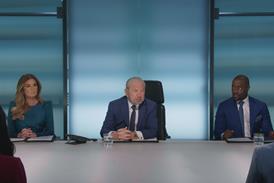Dermot O’Leary and Joe Lycett among 800 signatories to Bectu-penned open letter forged in wake of Noel Clarke allegations
Dermot O’Leary and Joe Lycett are among 800 signatories to an open letter penned by Bectu’s anti-bullying officer that calls for an end to sexism and sexual harassment.
Penned in the wake of the Noel Clarke allegations, producer Meriel Beale’s letter makes clear that last week’s claims, which the actor has denied, are not a one-off or extreme example but have been normalised by the industry and form part of everyday work for many women.
She said that many instances take place “in plain sight”.
These instances include: “Talking over us, comments in the workplace about our appearance, men discussing openly what they’d like to do to us, relentless private messages, groping, intimidation and sexual assault.”
Those are just some of the stories being shared online after 20 women accused Clarke of harassment and sexual misconduct.
“We just want to do our jobs. But we end up having to manage and navigate these situations,” Beale wrote.
The letter calls for an increase in the number of women in senior positions in TV, the nurturing of older women and women with caring responsibilities to “filter down throughout the industry” and for men to call out “bad behaviour”.
It ends by asking the industry to put an end to “this culture that turns a blind eye to predators and harassers operating in plain sight”.
The letter came as Bectu head Philippa Childs wrote a similar comment piece for Broadcast urging resource to be redirected to solve the issue in order that Noel Clarke’s alleged behaviour isn’t repeated by others.
Those wishing to sign the letter can do so here.
Meriel Beale: open letter to the film and TV industry
After reading the Noel Clarke allegations, many of us within the TV and film industry started sharing our own stories of sexual harassment and sexual abuse. His case is not a one-off and, shockingly, is not an extreme example.
It has happened to so many of us that it seems normal.
It has happened to so many of us at the hands of men in positions of power within the industry - whether industry colleagues, presenters or actors.
It has happened in plain sight.
From talking over us, to comments in the workplace on our appearance, to men discussing openly what they’d like to do to us, to relentless private messages, to groping, to intimidation and to sexual assault. These are the stories women have been sharing over the last few days.
We are told ‘it’s just his way’ or ‘you should be flattered’. We are asked ‘are you sure you want that man to lose his job?’ We are asked ‘who did you sleep with to get that job?’
We are told to ‘lighten up’ and to ‘take a joke’. As we get older, we are told our worth has decreased.
How does a young, female runner take the ‘joke’ of being asked for a ‘gangbang’ by her senior male producer in a room where she is the only woman? How does she handle having a Twitter account set up in her name with inappropriate tweets sent to the presenters she is working with? How does a woman carry on trying to lead her team when she has been groped in front of them? How do you work with a male presenter after he puts his hands all over you?
We just want to do our jobs. But we end up having to manage and navigate these situations. We don’t want to be seen as ‘killjoys’ and we don’t want to anger the men into violence. It is a constant, terrifying tightrope. We are exhausted and we are angry.
All of this contributes to us being undervalued in TV. Many men won’t recognise or notice sexist micro-aggressions - the low level hum of sexism - and many women will accept it as part of the culture. It has been normalised, but it is not normal.
We need more women in senior positions in TV and film. We need them to be allies and to be empowered to make real change. We need older women and women with caring responsibilities so that this filters down throughout the industry. We need women to be taken seriously. We need men to call out bad behaviour.
This is just one of the areas of discrimination and abuse within the TV industry and one that intersects with issues of race, gender, sexuality and disability. The Diamond survey from January 2021 reveals that, as in 2018-19, women, transgender, Black, Asian and Minority Ethnic and disabled people continue to be less well represented in senior roles. In fact, there has been a decrease in contributions at senior level made by females (47.1%, down from 50.4% in 2018-19).
It is time to rethink the culture of TV and film. It is time to put an end to this culture that turns a blind eye to predators and harassers operating in plain sight.
































No comments yet